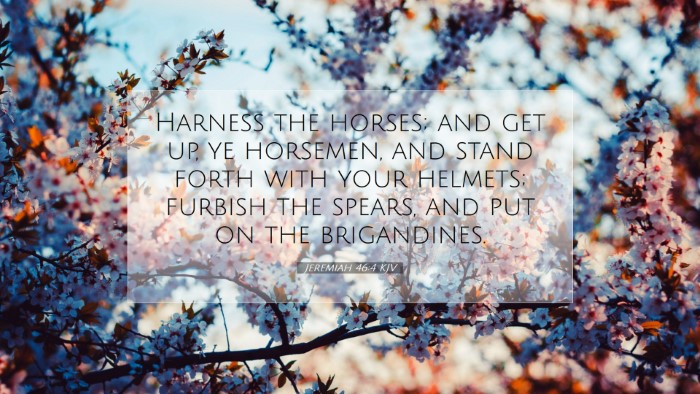Commentary on Jeremiah 46:4
In examining Jeremiah 46:4, where it states, "Prepare ye the buckler and shield, and draw near to battle.", we find a rich vein of theological significance and practical application that has been addressed by various public domain commentaries throughout history. This verse, situated within the broader context of God's impending judgments against the nations, especially against Egypt, presents both a historical and a prophetic lens that bears relevance for today's believers and scholars alike.
Contextual Background
Jeremiah, known as the weeping prophet, delivers messages not just of warning but also of hope amidst impending calamities. Chapter 46 introduces a series of messages regarding the nations, with Egypt being a central focus due to its pride and idolatry. The overarching theme concerns the sovereignty of God over all nations and His ability to use even the most powerful as instruments in His will.
Commentary Insights
Matthew Henry's Commentary
Matthew Henry emphasizes the seriousness of the call to battle in this verse. He notes that the command to "prepare" reflects the urgency and necessity of being ready to face God's judgment. Henry asserts that this not only pertains to physical readiness but also to spiritual preparedness. The use of the words "buckler" and "shield" signifies the need for defense against the judgments of God and the inevitable challenges faced in life.
Henry also reflects on the imagery used; the buckler and shield symbolize protection and strength, which are vital for any who would engage in spiritual warfare. In a broader sense, Henry mentions how this verse serves as a metaphor for how believers must prepare their hearts and lives against both spiritual and physical adversaries.
Albert Barnes' Notes
Albert Barnes, in his exposition, highlights the historical context of the Egyptian forces preparing for battle. He provides a vivid picture of the military might of Egypt, noting that they were called to arms in a display of both political and military ambition. Barnes explains that the call to arm emphasizes the folly of relying on physical strength and military strategy when God's judgment is at hand.
Furthermore, Barnes stresses that this preparation is not merely an act of human endeavor but rather a divine orchestration. God calls nations into battle, reminding readers that He is ultimately in control of human affairs. This notion serves as a caution against pride and self-reliance.
Adam Clarke's Commentary
Adam Clarke provides an in-depth look at the terminologies used within the verse. He indicates that "buckler" and "shield" have distinct meanings in ancient warfare – the buckler being a smaller, personal shield, and the shield offering broader protection in combat. Clarke underscores that this distinction illustrates the various aspects of spiritual defense available to believers.
Clarke also addresses the theological implications of "drawing near to battle." He suggests that this phrase implies not just physical preparation but also a readiness of spirit. He encourages believers to be engage in prayer and repentance as part of their spiritual arsenal. Clarke's insights encourage readers to understand that facing spiritual battles requires more than just human effort; it requires divine empowerment.
Theological Implications
This verse encapsulates several key theological themes:
- The Sovereignty of God: The call to prepare for battle serves as a reminder that God is the ultimate commander, orchestrating the events of history according to His will.
- Human Responsibility: While divine sovereignty is paramount, there is a corresponding human responsibility to prepare one's heart and life for spiritual warfare.
- The Nature of Spiritual Warfare: The imagery of shields emphasizes the need for protection against both external forces and internal temptations, reinforcing the importance of spiritual vigilance.
Practical Application
For pastors, students, and theologians, the call in Jeremiah 46:4 to prepare for battle can translate into several practical applications:
- Spiritual Vigilance: Believers are encouraged to remain vigilant and prepared for the battles they face daily. This may involve regular prayer, community engagement, and a reliance on Scripture for strength.
- Preparation for Corporate Worship and Ministry: Churches must prepare not just for physical events but for spiritual warfare through prayer, worship, and teaching, preparing hearts for engagement with one another and the world.
- Awareness of God’s Sovereignty: Understanding that God governs the affairs of nations encourages both humility and boldness in approaching both personal and communal challenges.
Conclusion
Jeremiah 46:4, through its vivid imagery and authoritative tone, reminds readers of the seriousness of spiritual preparedness amid the realities of God's judgment and sovereignty. As reflected in the insights from Matthew Henry, Albert Barnes, and Adam Clarke, the implications are both historical and contemporary, calling for deep introspection, preparation, and reliance on God as the sole source of strength in the face of adversity. In a world that often distracts from spiritual realities, this verse serves as a clarion call to engage diligently in the life of faith.


